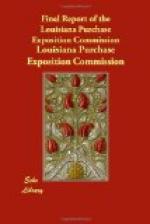Children admitted free were newsboys, office boys, messenger boys, all children earning their living, or whose parents were employed within the exposition grounds. Many of these came regularly. The hospitality of the playground was also open to the children of the orphan asylums and other charitable institutions and to the children of the city playgrounds and kindergartens.
The number of children admitted
free was, in May and June, 336;
July, 554; August, 8,616;
September, 3,916; October, 1,789;
November, 5,700.
On November 2 the children
of all nations were received by Miss
Helen M. Gould, who gave a
souvenir gift to each child.
On November 24 the children of all nations attended Thanksgiving dinner and ceremonies at the playground; 326 children were seated at the tables. After dinner they played and enjoyed the many features provided for their amusement. Every child took home a box of dainties and a souvenir of Thanksgiving Day, that traditional New England festivity. A member of the National Commission planned the affair, and it proved a notable success. Children of twenty-eight nationalities or tribes were gathered on the playground at one time. No such representation ever took place before, or was possible, except at the Model Play Ground and Day Nursery of the Louisiana Purchase Exposition.
It continued to be of service even to the closing hour. On December 1, the final day of the fair, 48 children, of whom 19 were less than 1 year old, were checked; 2,000 children were admitted free of charge, and 31 lost children were cared for and returned in safety to their homes or guardians.
In reviewing the experiences of the fair, it is gratifying to realize that although the members of the board of lady managers were not able to carry out one of their most cherished desires, and suffered keen disappointment in the abandonment of the creche, still they had the pleasure of rendering material aid to a beautiful work, for such certainly was the Model Play Ground and Day Nursery.
Mrs. Hirschfield states that the assistance given by the board of lady managers can not be measured, for far beyond the money value of their appropriation was the power of their influence, and the interest aroused was not alone for the occasion of the fair, but would reach far into the future, affecting other undertakings of a similar nature.
On the day following the close of the exposition, one of the most able of the directors of the exposition expressed his approval of the course of the board of lady managers. As hostesses of the fair, he complimented them gracefully, and for the attitude they had been obliged to take regarding the creche, of which he had been critical, he was happy to say he had been converted, and he was convinced that the board had acted prudently and wisely; that undoubtedly the attempt to carry on




